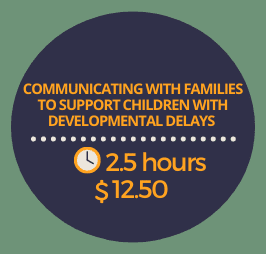
Communicating with Families to Support Children with Developmental Delays
If you are employed in a state that uses a registry to track professional development hours, you will be able to provide your registry ID (Stars, MOPID, Registry or other ECE ID#) after you have completed the quiz for the course. If you pass the quiz we will report your course completion to the state registry using the registry ID that you provide.
Many childcare providers are hesitant to discuss observed behaviors with parents and caregivers surrounding developmental delays of their children. This can cause a breakdown in communication and lack of a trusting partnership between childcare providers and families. This can also delay needed services to be received by a child. This course will provide childcare providers the information they need to feel informed and confident with communication skills and options, especially when dealing with sensitive subject matter. It will also help empower childcare providers to build a partnership between their care, familial and non-familial caregivers and community/state level resources for those children. Course length – 2.5 hours.
The course helps answer the following questions:
How do I establish good communication with families from day one?
What should I do if I believe a child in my care may have a developmental delay?
How should I approach family members if I have a concern that their child may have a developmental delay?
How can I advocate for families while they are going through the process of seeking help for their child?
Participants who successfully complete this course will:
Know how to establish and maintain strong relationships with families from the moment they come into the center for a tour.
Feel informed and confident in communication skills and options, especially when dealing with sensitive subject matters, like developmental concerns.
Be prepared to assist in building a partnership between child care, familial or non-familial caregivers and community/state level resources for children.